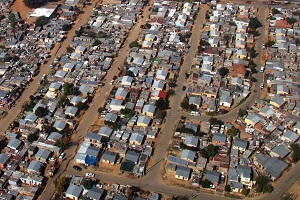
Finance Minister reaches milestone
Minister of Finance Saara Kuugongelwa-Amadhila
Major highlights of the past ten years
In May, the Minister of Finance Saara Kuugongelwa-Amadhila reached a significant milestone in her political career. Last month was the 10th anniversary when the then 36-year old Kuugongelwa-Amadhila was appointed as the country’s first female Minister of Finance. The Economist sat down with her to find out about her eventful journey in the hot seat, her achievements in the ministry, relationship with the mining industry, her challenges, regrets and her personal life. This portrait is an excerpt of that interview with Nyasha Francis Nyaungwa. The minister speaks in the first person.There has been a number of important milestones that were realised that I will always consider as amongst the highlights. One of the highlights is that revenue performance has increased significantly. In terms of proportion of revenue to the economy, we are amongst the leaders in the region. I think these are some of the indicators that you look at to see how you are fairing in terms of compliance enforcement. This is not to say that we have achieved everything and we cannot improve. There are many areas where we need to improve and we have reform programmes that are approved to enable us to reform the administration of this function, but we have managed even during the period of the crisis to have high ratios of revenue to GDP because of the range of measures that we have instituted.
The other highlight is when we thought of promoting public private partnerships with the private audit firms to help us strengthen our capacity to enforce compliance to tax laws because we suspected that in addition to the economic hardships [that were being experienced when she first started as Minister of Finance] we also had people that were going around not paying what they were supposed to pay to the tax authorities.
The partnership had a positive impact on the situation that some people started to comply voluntarily and we saw significant improvement in revenue collection so that in 2007, I remember we had a budget increase of the largest magnitude that we had ever had and that was one of the greatest highlights.
I felt quite happy being able to achieve that. In addition, it enabled us to even build up reserves at the central bank. We were able to prepay some of our debts which we considered to be more expensive; we were able to restructure our debt so that we could have it in correct proportions between foreign borrowing and domestic borrowing, and also long term and short term borrowing.
When the crisis hit in 2007 and many countries were cutting their budgets because of austerity measures, and other countries even within our region, were introducing new taxes, we were able to expand our budget and even offer tax concessions. We were able to consolidate our fiscal position, reduce debt ratios from somewhere around 32% to about 16% two years ago. That gave us the foundation on which we were able to use the fiscal support to the economy at the time when the economy was very vulnerable.
Major challenges
One of the challenges is that we have seen that around the regions, a key factor in optimising revenue collection is to attract the requisite skills in sufficient numbers and this is a challenge within the setting of the public service. What we have been doing as part of the reforms that we are undertaking is to investigate the options that are available to us to restructure that office [Inland Revenue], looking at possibilities even to outsource, to set up a semi-autonomous agency to administer this function so as to give us the flexibility to mobilise the personnel and to be in full charge of the system without having to rely on the public service. This is one of the issues.
What keeps you awake at night?
What keeps me awake is the challenge of making sure that we are able to continue to use the government budget to provide support to the economy without necessarily creating a burden for our future generation in terms of unsustainable debt.
There are some programmes that are very very close to my heart. I believe very strongly that for any nation to realise development ambition, it must have the technical capacity to implement its policies and to drive development. You can never achieve industrialisation by just relying on foreign investors, and your own people do not have the skills to man the industries and to even set up local enterprises so that you have local participation in the industrial programmes.
Therefore the education sector is very important in my view and specifically the skills provision. We must make sure that our young people can go to universities and to technical colleges to acquire the requisite skills because it is these at the end of the day that are going to enable us to add value to our minerals in addition to manning other industries. If I know that there are many young people out there that have qualified to go to tertiary institutions and they cannot go because they don’t have the means and we are not able to provide that in the budget; it is a concern and it is one of the things that I want to be able to make an impact on.
If you look at the budget, you will see the effort that we are making. In the past two years for example, the allocation to this programme has grown from about N$200 million to over N$600 million per annum. We are committed to continuously strengthening this so that we ensure that all young people who qualify to go for tertiary education have an opportunity to do that so that they can realise the dreams of our founding fathers and take Namibia to industrialisation by 2030.
The hardest part of being finance minister is that you are not only responsible for the financial management, but you are also responsible for ensuring that the necessary funds that are needed are raised and made available to implement programmes. This calls for you to achieve two objectives which seems like a contradiction.
You could tell by the way the public reacted to this year’s budget. There is one segment that lauded the fact that we continue to have an expansionary budget in order to support very important development programmes, but then there is also a strong voice talking about the need for consolidation and the risk that lies in this sustained expansion over a number of years. That is the inherent kind of contradiction that there is in the fiscal policy of a developing nation like Namibia which faces a situation of high inequality.
How do you achieve fiscal sustainability by making sure that you do not expand beyond sustainability when you have unemployment rates of the kind that we have and inequality of the kind that we have? That is the most difficult part of being the finance minister in a country that has two worlds in one. It is thinking about how to balance these two that keeps me awake at night.
We must be able to sustain what we are doing now. I am quite aware of that and I know that it is a challenge to always maintain that balance.
Being appointed DG and Finance Minister at a young age
It is an honour for which I will be eternally grateful both to my appointing authorities and also to the Namibian nation for giving me the support that they have given me to enable me to carry out my work over the period that I have been in these two institutions.
I think that having been at the National Planning Commission has somehow assisted me in my work as finance minister because it has enabled me to experience the other side of fiscal policy which is the development part so that I will come here and not just be preoccupied about numbers. The budget is a policy instrument that is aimed at achieving certain development objectives some of which I was a part of formulating. I think that was very important and it has helped me a great deal.
What other ministerial position would you fancy?
Chuckles….You see being at the Ministry of Finance keeps you so busy that you have no luxury to start thinking about things like that. I have my plate full at the Ministry of Finance. My main preoccupation now is just to give my best to this ministry so that one day when I am old,Ii can look back and say I have given it my best. In any case it’s not up to me where I will be so there is no point really to think about that.
Any regrets?
No! because every experience that we have gone through has contributed to what we have been able to achieve. All the difficulties have just made us stronger and wiser so that we can improve.
You spare time
I spent time with my family. I am a family loving person; I love children and whenever I have time I spend it with my family. Unfortunately those times are short and few because when you are the Minister of Finance, even on Christmas Day you may be required to do some work and you are always prepared for that.
Message to the public
My message is that the public finances that we are managing are ours. I hear people talking about government money, the government should do this, government should increase our salaries. Government has nothing. Government is only an institution that is charged with the custodianship of what belongs to all of us Namibians.
The resources are ours, the taxes are contributed for our own good, not to the government. Government is only handling these affairs on our behalf. So please support tax compliance. Be compliant so that we can make sure that we raise the resources that we need to sustain ourselves as a nation. Help us to protect the public assets; the cars that you see out there, please report to us when you see that they are being mishandled, please report those that you see misappropriating government funds, please protect the schools, the clinics and everything else that is being paid for with your money.
Support the efforts to grow the economy. If you are an entrepreneur, please think about producing something here, adding value to something. Think about creating jobs because job creation is important not only to ensure that those people have a means to live but also to ensure social stability that we all need to live a peaceful life.
Relationship with the mining industry
Chuckles…Well I think that it is a very vibrant one. The mining sector is a very important stakeholder in the Namibian economy both in terms of its contribution to GDP and also in terms of the potential contribution that it can make to the national fiscus and because of that the dialogue that we have had with them regarding the plans that we have for the tax policy for the industry has been very vibrant and very vocal and that has caused some people to think that maybe there is something wrong in our relationship with them. But that is not the case especially not from the side of the Ministry of Finance.
This can be confirmed by the magnitude of the tax concessions that goes to the mineral industries. This shows how important the government considers that industry to the Namibian economy. We only want to make sure that these investments that we make into the sector translates into improved outflows in terms of actual cash contribution towards the fiscus, which we need to make sure that we have the infrastructure, the skills, the productivity of labour. They also need [this] in order to recover their own investments.











































